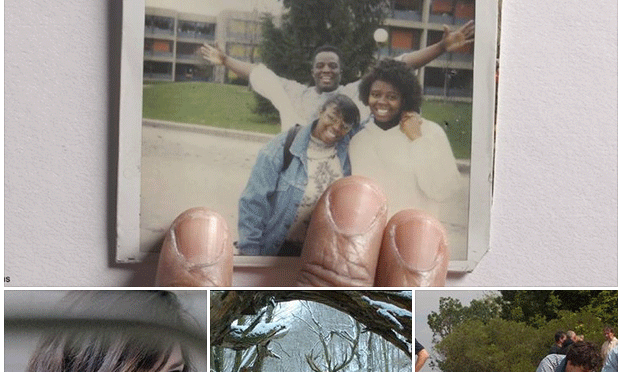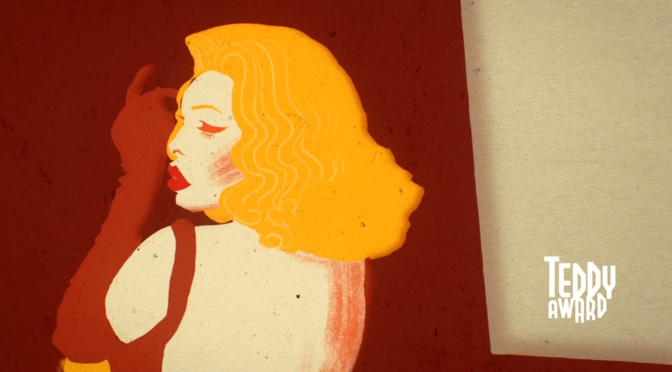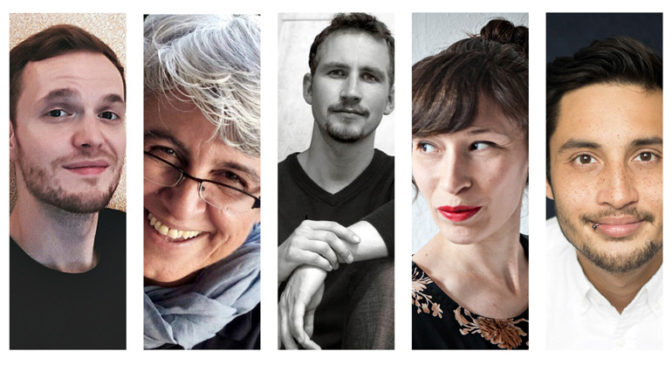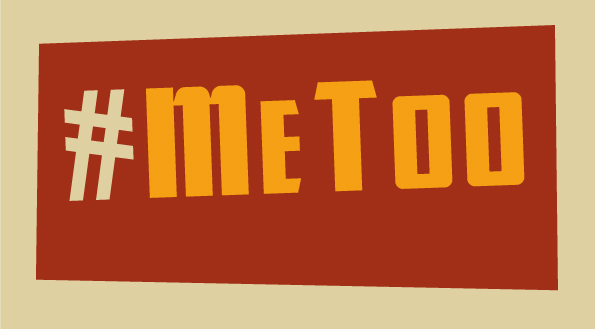YESS! Another good reason to look forward to the TEDDY 2018 edition.
Three TEDDY AWARD 2017 films are nominated for the Oscars: “Call Me By Your Name“ by Luca Guadagnino for Best Actor, Best Picture, Best Screenplay and Best Original Song, “Strong Island“ by Yance Ford for Best Documentary Feature as well as last year’s TEDDY AWARD winner Una mujer fantástica by Sebastián Lelio for Best Foreign Language Film.
Congrats and fingers crossed!
Monthly Archives: January 2018
TEDDY Trailer 2018
Enjoy the trailer of 32. TEDDY AWARD created by Marion Habringer.
32. TEDDY AWARD Ceremony
23. Februar 2018 @ Haus der Berliner Festspiele
TICKET HOTLINE 030-4799 7474
TEDDY artwork by cabine
TEDDY Readers’ Award powered by Mannschaft Magazin
As proud media partner of the Teddy Award, Mannschaft will award the “TEDDY Readers’ Award” 2018. These five film freaks will decide.
For over 30 years, the “Teddy Award” has honored queer films within the framework of the Berlinale. In 2018, Mannschaft Magazin will participate for the first time as media partner and present the “Teddy Readers’ Award”. Until the 15th of December, queer film fans could apply to be members of the jury. Mannschaft received a large pile of dossiers, which did not make the selection easy! Finally, they opted for a composition that unifies different aspects of filmmaking and queer interests, as diverse as possible. The Teddy will be awarded on February 23rd at the Haus der Berliner Festspiele. The 68th Berlin International Film Festival will take place from February 15 – 25, 2018 – teddyaward.tv
Martin Busse, 30
Born in Berlin, Busse is a music editor for Mannschaft, but also passionately interested in queer filmmaking. As a child, he wanted to be a director; today Martin owns no less than 600 DVDs, from Arthaus to Trash. As jury president and official representative of Mannschaft, Martin will lead the jury.
Katayun Pirdawari, 54
Katayun can be found at the Berlinale almost every year and brings along a lot of experience: she has already participated in the readers’ jury for Siegessäule and Männer Magazin. For almost thirty years, the 54-year-old with Persian background has stood up for LGBT rights and for lesbian Iranian women, including four years as a board member of the Lesbian and Gay Association LSVD. Because of the AfD, Trump, Erdogan and Putin, Katayun is particularly curious about this year’s Berlinale films.
Holger Beisitzer, 42
Holger is a regular moviegoer and once shot a “very short short film” for a competition, as he says. As a gay dad, the artist and interior designer contributes the perspective of a rainbow family.
Christine Burkart, 35
Christine is a freelance video journalist, photographer and museum pedagogue and has long been passionate about queer topics. She describes herself as openly bisexual, even if labels almost always seem too one-dimensional to her. During her studies, she dealt with art history, gender theory and film studies issues – knowledge she will gladly draw on as a juror.
Adriell Kopp, 30
For Adriell, the presence of queer film characters as well as the filming of their destinies is an essential part of finding the identity of the LGBT community. A big fan of queer cinema and a student of media studies, the 30-year-old has a well-trained eye for media aesthetics, queer art and identity politics.
Translation by Naomi Scherer
Expanding the ‘Me’ in ‘Me Too’
Where are the voices of LGBT+ survivors?
The growing number of voices speaking out against sexual assault in the film and entertainment industry mark a seismic shift in cultural attitudes towards sexual violence. Finally we are seeing accusations of sexual assault treated with the severity that should have been the norm decades before; with recurrent perpetrators like Harvey Weinstein and James Toback being removed from their thrones of abuse we might consider much of the hard work already done. But the reality is that for every voice speaking out, there’s another still silenced by the pressures of stigma, fear and shame. Among those many muted victims are members of the queer and gay community, upon whom the weight of social stigmatisation can fall heaviest.
Of the survivors who have been empowered to speak out, the vast majority are cis-het women, alongside several cis-het men (Terry Crews, James Van Der Beck). And yet, Anthony Rapp, the victim of Kevin Spacey’s unwanted sexual advances at the raw age of 14, is one of a notably small chorus of queer and trans voices confident enough to articulate similar experiences of assault as their cisgendered counterparts. Statistically transgender people are at greater risk of sexual violence than cis women[1], bisexual men and women experience assault more regularly than their straight compatriots, lesbians are almost 10% more likely to experience rape than straight women, and gay men face double the risk of sexual violence than heterosexual men[2]. It would be fair to assume that these figures will also be reflected in the sexual crimes of the film and entertainment industry. Why is it, then, that so few of the LGBTQ community feel empowered to speak up alongside their cis-het colleagues?
According to Andria Wilson, executive director of Toronto and Ottawa’s Inside Out Film Festival, “As LGBTQ people, we face additional barriers and oppressions…So in many ways that means these kind of offences are more common and less frequently reported.”[3] Included in those barriers is the double-pressure that queer and trans people might face in “coming out” simultaneously about their sexuality and about their experiences of sexual violence. Not only does that add to the difficulty of vocalising the abuse they’ve endured, it can also conflate those two experiences under the same feeling of trauma in a kind of reverse-effect of Spacey’s dual “confession”. On top of this issue is the perception of homosexuality and transgenderism as sexual deviances among certain societies, meaning, according to trans activist Ashlee Marie Preston, cisgender, white accusers “are a bit more protected by respectability politics than trans women of colour”[4].
Subtler still is the way in which the vocabulary used to delineate sexual violence excludes members of the queer and trans community. Typically, sexual assault is figured in terms of male aggression on women, whilst ‘rape’ specifically denotes sexual penetration. Such language leaves blanks when it comes to expressing, for example, instances of women-on-women violence. When we consider that it was only 2016 when Germany changed its rape laws so that victims of rape need not give evidence of self-defence[5] it’s hardly surprising if there’s a lack of trust in the legal and societal framework supposedly supporting survivors.
The gaps in that support network extend to the world of social media: whilst it is hugely encouraging to see so many women brave enough to participate in the “Me Too” campaign, it is also essential to recognise the narrowness of the vocabulary used to ignite the hashtag. The instruction for “women who have been sexually harassed or assaulted” to write a “Me Too” status erases the possibility that sexual assault might be something more complex than male-on-female sexual aggression. As the statistics referred to earlier suggest, trans and queer people face a heightened risk of sexual violence, and it is therefore vital that we are equipped with the legal, linguistic and societal support to match that risk. Without that, any claims to definitive progress feel blinkered by a heteronormative notion of what constitutes sexual violence, and who has the right to the “Me” in “Me Too”.
[1] https://sapac.umich.edu/files/sapac/SV%20Against%20Trans%20People_1_0.pdf
[2] http://www.transequality.org/sites/default/files/docs/usts/USTS%20Full%20Report%20-%20FINAL%201.6.17.pdf
[3] http://www.cbc.ca/news/entertainment/spacey-lgbt-react-power-vulnerable-1.4381878
[4] https://www.vice.com/en_us/article/qv34wb/we-bring-it-on-ourselves-the-myths-silencing-lgbtq-sexual-assault-victims



